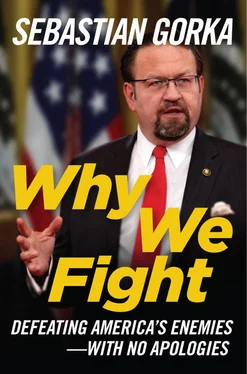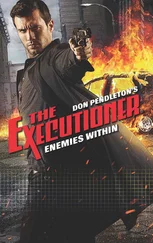Sebastian Gorka - Why We Fight - Why We Fight - Defeating America's Enemies - With No Apologies
Здесь есть возможность читать онлайн «Sebastian Gorka - Why We Fight - Why We Fight - Defeating America's Enemies - With No Apologies» весь текст электронной книги совершенно бесплатно (целиком полную версию без сокращений). В некоторых случаях можно слушать аудио, скачать через торрент в формате fb2 и присутствует краткое содержание. Город: Washington, Год выпуска: 2018, ISBN: 2018, Издательство: Regnery Publishing, Жанр: Политика, Публицистика, на английском языке. Описание произведения, (предисловие) а так же отзывы посетителей доступны на портале библиотеки ЛибКат.
- Название:Why We Fight: Why We Fight: Defeating America's Enemies - With No Apologies
- Автор:
- Издательство:Regnery Publishing
- Жанр:
- Год:2018
- Город:Washington
- ISBN:978-1-62157-640-2
- Рейтинг книги:5 / 5. Голосов: 1
-
Избранное:Добавить в избранное
- Отзывы:
-
Ваша оценка:
- 100
- 1
- 2
- 3
- 4
- 5
Why We Fight: Why We Fight: Defeating America's Enemies - With No Apologies: краткое содержание, описание и аннотация
Предлагаем к чтению аннотацию, описание, краткое содержание или предисловие (зависит от того, что написал сам автор книги «Why We Fight: Why We Fight: Defeating America's Enemies - With No Apologies»). Если вы не нашли необходимую информацию о книге — напишите в комментариях, мы постараемся отыскать её.
Why We Fight: Why We Fight: Defeating America's Enemies - With No Apologies — читать онлайн бесплатно полную книгу (весь текст) целиком
Ниже представлен текст книги, разбитый по страницам. Система сохранения места последней прочитанной страницы, позволяет с удобством читать онлайн бесплатно книгу «Why We Fight: Why We Fight: Defeating America's Enemies - With No Apologies», без необходимости каждый раз заново искать на чём Вы остановились. Поставьте закладку, и сможете в любой момент перейти на страницу, на которой закончили чтение.
Интервал:
Закладка:
I was only nine, the same age my father had been when World War II broke out, when the geopolitical significance of my father’s life in Hungary was finally revealed to me. After four decades, I remember it so very clearly.
We were watching the evening news in our living room. My parents were very engaged with the world around them and my immersion in matters political started at an early age. It was November 1979, and the champion of Western democracy and all things British, Margaret Thatcher, was the prime minister. Just a few days earlier, a huge scandal had erupted when an investigative journalist revealed that the famed art historian and director of the Courtauld Institute, Sir Anthony Blunt, had been a member of the “Cambridge Apostles,” a ring of Soviet spies during the Cold War which betrayed Great Britain and her allies. The scandal raged all the more forcefully because Blunt had admitted his guilt in 1964 in exchange for immunity from prosecution. The whole affair was kept secret from the British people for fifteen years.
The case of the Apostles, or “Cambridge Five,” as they were called, was the most dastardly and damaging case of treason during the Cold War. The ring’s members—Kim Philby, Donald Maclean, Guy Burgess, Blunt, and John Cairncross—had studied in Cambridge, where they were recruited to spy on the British government for the KGB. After graduating, four of the five joined the civil service, to include British intelligence, and betrayed the trust shown them by selling their nation to the Soviets.
When it was revealed that Sir Anthony, a fixture of high society, had been one of the spies and granted immunity, the prime minster was forced to respond publicly. In her statement to Parliament, Mrs. Thatcher confirmed Blunt’s treachery, for which he would be stripped of his knighthood, but reassured the nation that his actions had never endangered any British lives.
As we watched the prime minister on television, my father said, “Oh, I know no British agents died. But hundreds of Hungarians, Poles, Czechoslovaks, and Yugoslavs did.” One of them was Bela Bajomi, hanged in the courtyard of the political prison in Budapest, as Leslie, Michael, and my father listened from their cell.
It was that statement by the head of the British government that spurred my father to write his own story, published in London as Budapest Betrayed . He detailed how as a teenager after the war, he saw the promises of Yalta—that occupied countries like Hungary would begin again in freedom—violated from the Baltics to the Balkans, as Nazi regimes were replaced by communist dictatorships.
Once the communists had fully taken over Hungary, my father started college. It was there he decided to resist the new dictatorship.
Identifying a handful of patriots among his fellow students, he helped Bela Bajomi organize a secret Christian resistance group. The plan was to covertly collect information on what the Communist Party was doing, how the Soviet troops were deployed across the country, and how the Kremlin was stealing the country’s national assets and industries. The information would then be spirited out to a Western country, and when the world saw that Stalin was in breach of the treaties made at the close of the war, pressure could be applied against Moscow.
The members of the group succeeded in obtaining internships in strategic industries and offices crucial to the communist takeover. Bajomi managed to establish a secret line of communication to the United Kingdom. Soon enough, prosaic letters were being mailed at regular intervals to an MI-6 cut-out with the crucial data inserted between the anodyne script with an invisible ink. For several months, at great risk to their liberty and their lives, these young men, including my father, smuggled the truth out of captive Hungary with the hope that it would be used to weaken Moscow’s grip and restore the nation’s independence. But it wasn’t to be.
As my father chronicled in his autobiography, the reports sent to London would eventually land on the desk of none other than Kim Philby: Soviet agent, Cambridge Apostle, and traitor to the West. Once he had received enough collateral information to identify the group’s members by name, Philby betrayed them to his Soviet handlers, who then informed Moscow. When Moscow informed the Hungarian secret police, my father and his fellow patriots were arrested, tortured, and imprisoned. Bela, their leader, was executed.
At his trial, my father was also to be given a death sentence at the age of twenty. However, thanks to a well-connected great uncle, he was spared execution. Instead he received a “ten-year” sentence, which would have doomed him to die in prison since his classified sentencing document was stamped: “not to be released even after serving sentence.” This document came into my father’s hands after the communist regime fell in 1990.
As you can read in Defeating Jihad , my father spent two years in solitary confinement for being an “enemy of the state,” following two years in a prison coal mine, and another two years in the main political prison outside Budapest. On October 23, 1956, the Hungarian people fought back against the dictators, and my father’s and mother’s lives changed forever.
After eight years of full-fledged communist dictatorship, several thousand students and factory workers banded together in an uprising that would become the Hungarian Revolution of 1956: the first attempt by a nation under Soviet occupation to free itself from the Kremlin. With captured weapons and homemade Molotov cocktails, the oppressed stood up to their oppressors, and for ten heady days, Hungary was free. The freedom fighters captured a Russian tank, battered down the prison gate, and liberated my father and his fellow prisoners of conscience from the hell of their communist confinement.
Hungary’s freedom was short-lived, however. With hundreds of tanks called from Ukraine, Romania, and thousands of Soviet reinforcements, Moscow viciously crushed the revolution. Prime Minster Imre Nagy and other leaders were kidnapped and murdered. Hearing that he too was on a shoot-to-kill list, my father escaped across the minefields into neutral Austria with his prison mate’s seventeen-year-old daughter and future wife, Susan.
When asked in the refugee camp where they would like to live—unware that it was Philby in London who had betrayed them all—my father told the resettlement officer that they wanted to live in England. That is how I came to be born and raised in London, a British subject but Hungarian by family upbringing.
I didn’t know the full story of my father’s fight for a free Hungary or how he had suffered until the Blunt scandal erupted, prompting my father to write his book and share the shocking details of his childhood. But our home was often the location for reunions with onetime comrades and fellow prisoners like Father Bela Ispanki, the enigmatic Catholic priest and personal secretary to Cardinal Mindszenty, who was arrested and imprisoned for rallying Hungarian Christians against the communist dictatorship, and Laci, who had become a successful psychiatrist with a house on Lake Geneva. After the freedom fighters crashed through the prison gate with their Russian tank, Laci was made temporary prison warden whilst the true political prisoners were sifted from the common criminals, whom the revolutionaries were not keen on “liberating.”
The values of my father and his compatriots formed the moral environment of my childhood. Tyranny, whether Nazi or communist, wasn’t an abstract concept in a history book. It was the marks on my father’s wrists. Resistance to dictatorship wasn’t a vague platitude. I could touch it in the form of the tiny crucifix my father had carved out of a multicolored toothbrush handle in prison, Jesus’ white body lying on the Bakelite blue of the cross. It was in the stories he shared of prisoners covertly collecting the raisins from their meals to make wine so the priests imprisoned with them, like Father Bela, could celebrate a secret Mass inside the prison. Determined to preserve our freedom, which he didn’t take for granted, my father taught me how to handle a gun as soon as I could reliably hold one up and use it safely. He knew that all dictatorships want the population disarmed, and that a citizen without a means to protect himself and his liberty is not a truly free man. Thank you, Father.
Читать дальшеИнтервал:
Закладка:
Похожие книги на «Why We Fight: Why We Fight: Defeating America's Enemies - With No Apologies»
Представляем Вашему вниманию похожие книги на «Why We Fight: Why We Fight: Defeating America's Enemies - With No Apologies» списком для выбора. Мы отобрали схожую по названию и смыслу литературу в надежде предоставить читателям больше вариантов отыскать новые, интересные, ещё непрочитанные произведения.
Обсуждение, отзывы о книге «Why We Fight: Why We Fight: Defeating America's Enemies - With No Apologies» и просто собственные мнения читателей. Оставьте ваши комментарии, напишите, что Вы думаете о произведении, его смысле или главных героях. Укажите что конкретно понравилось, а что нет, и почему Вы так считаете.












